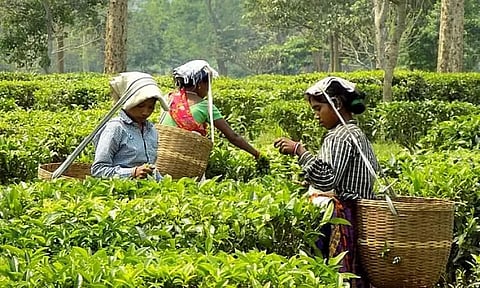
- Home
- Live Blog
- Breaking News
- Top Headlines
- Cities
- NE News
- Sentinel Media
- Sports
- Education
- Jobs

The decision by the Bought Leaf Factories (BLF) to resume procurement of green leaf from Small Tea Growers (STG) has brought an end to the deadlock for now, when fresh plucking has just begun. The cloud of uncertainty has not completely gone away, as the apex body of the BLF has warned of halting purchases again if the Tea Board fails to resolve the standoff over its directives to produce tea only from green leaves without any chemical residue and on dust-grade tea sales by April 26. The 200-year-old tea industry in the state is stuck in a quagmire of policy gaps and infrastructure bottlenecks. The ongoing crisis stems from a central government notification, which came into effect on April 1, making it mandatory for tea factories to sell 100% dust-grade tea through public tea auctions and in compliance with the norms of the Food Safety Standards Authority of India (FSSAI). The notified order states that every registered tea manufacturer shall, on and from the date of commencement of the Tea (Marketing) Control (Amendment) Order, 2024, sell not less than 50% of total tea manufactured in a calendar year and 100% of dust grade tea manufactured in a calendar year in its manufacturing units located in Arunachal Pradesh, Assam, Bihar, Himachal Pradesh, Meghalaya, Mizoram, Nagaland, Sikkim, Tripura, Uttarakhand, and West Bengal, through public tea auctions. The Tea Board issued a notification that the said government order will be applicable for a period of three months, with effect from April 1. At a consultative meeting conducted by the FSSAI in association with the Tea Board with tea stakeholders in October last year, the food safety regulator insisted that pesticides in tea shall not exceed the Maximum Residual Limit (MRL) prescribed in the Food Safety Standards and Regulations (FSSR). Tea quality conforming to food safety standards is of paramount importance for consumers, boosting confidence in tea as a healthy beverage. The “Plant Protection Code—Policy on Usage of Plant Protection Formulations in Tea Plantations of India” issued by the Tea Board in February is the comprehensive guideline for safe usage of Plant Protection Formulations (PPFs) in the tea plantations in India. The Code makes it mandatory that all manufacturers of tea are required to test their products as per FSSR 2011 standards for tea twice a year in six-month intervals from a National Accreditation Board for Testing and Calibration Laboratories (NABL) laboratory and upload the report on the FSSAI portal. The BLFs insistence on STGs producing laboratory test reports on pesticide limits along with green leaf is prompted by the Tea Board directive. About 2.3 lakh STGs contribute nearly 52% of the total tea produced in India. Assam has about 1.25 lakh STGs, and the sheer number of small tea gardens compared to a few NABL-accredited laboratories imply that adherence to the PPC can be possible only through awareness of the safe usage of PPFs for pest management by STGs and not by insistence on laboratory test reports. The establishment of a proportionate number of testing laboratories is an ideal situation, but it will require an adequate number of trained professionals to make them fully functional. Some of the measures recommended by the Tea Board in the policy include monitoring for early detection of pests, adoption of integrated pest management techniques, using only recommended safer pesticides, avoiding repeated spraying of the same pesticides, allowing a sufficient waiting period between spraying and plucking, avoiding blanket sprays as far as possible, resorting to spot treatment, and using pesticides only at the recommended rate and method. Focusing on these measures until the infrastructure gap in laboratory testing is bridged can provide a viable solution to the problem, which the Tea Board cannot lose sight of. Tea growers and manufacturers need to acknowledge that tea quality and safety standards cannot be put on the back burner if demand for Assam tea both in the national and international markets goes up. The sustainability of STGs is critical to the growth of the tea industry in the state and safeguarding the financial security of over 10 lakh family members of growers and workers. Collaborative efforts are needed to raise the food safety standards in tea manufacturing, right from tea growing to processing. A confrontationist approach cannot solve problems; it only makes them worse and more protracted, leaving no space for negotiation. The government needs to play a crucial role as a facilitator of regular and frequent consultation among all stakeholders in tea production. Any arbitrary and unilateral decision will only end up harming the interests of the primary stakeholders—growers, workers, and manufacturers. The Assam tea industry is already at the crossroads of environmental sustainability and economy. The wisdom of sustaining the industry for two centuries should guide the stakeholders in finding a lasting solution to the problems it is grappling with.